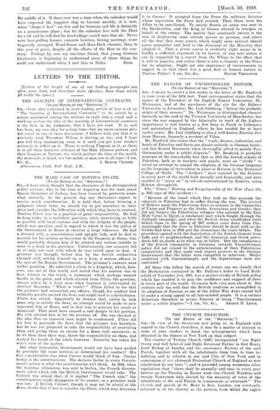THE DANGER OF UNCONTROLLED ZIONISM. [To THE EDITOR OF THE
" SPECTATOR."]
desire to correct a few errors in the letter of Mr. Brodrick in your issue of the 16th inst. Your correspondent states that the names of the President of the English Zionist Federation, Dr. Weizmann, and of the purchaser of the site for the Hebrew University in Jerusalem, Mr. Isak Goldberg, "betray the probable origin of their owners." Dr. Weizmann (a distinguished chemist formerly on the staff of the Victoria University of Manchester, but since the war engaged by the Admiralty in work of the highest importance) is well known as a Jew born in Pinsk in Lithuania and naturalized in England, where he has resided for at least twelve years. Mr. Isak Goldberg is also a well-known Russian Jew from Moscow, formerly a resident of Vilna.
Mr. Brodrick also states that the " trade, finance, industries, and
hotels of Palestine and Syria are almost entirely in German hands, and this Zionist Movement when thoroughly sifted is merely Pan- Germanism under a subtle disguise." Mr. Brodrick is probably unaware of the remarkable fact that in 1913 the Jewish schools of Palestine, both as to teachers and pupils, went on "strike" to resist an attempt to compel the adoption of the German language as the language of instruction in place of Hebrew in the Technical College of Haifa. The " strikers " were assisted by the Zionists in every part of the world both morally and financially, and were enabled to " carry on" in schools subventioned by Zionists, using Hebrew throughout.
The " Times " History and Encyclopaedia of the War (Part 178, p. 322) says of this incident :-
"Because of the stand which they took on this occasion the colonists in Palestine had to suffer during the war. The revival of Hebrew made the Palestinian Jews as noxious to the Committee of Union and Progress as the Arabs, Armenians and Greeks; they did not forgive the Palestinian refugees who enlisted in the Zion Mule Corps in Egypt, a combatant unit which, fought through the Gallipoli campaign; and when the British Army established itself before Gaza in the spring of 1917 orders came down from Con- stantinople that the Jews in Palestine should be dealt with as the Greeks had been in 1916 and the Armenians the years before. The procedure opened with the deportation of the Jewish element from Jaffa and its neighbourhood, and the Armenian and Greek prece- dents left no doubt as to what was to follow. But the complacency of the Jewish community in Germany towards Turco-German policy did not extend to the extermination of their Palestinian compatriots, and they made such urgent protests to the German Government that the latter were compelled to intervene. Berlin conferred with Constantinople, and the deportations were dis- continued."
All those who follow the march of events can see clearly that the Declaration contained in Mr. Balfour's letter to Lord Roth- schild of November 2nd, 1917, was a master-stroke of British policy which has enabled it to gain the confidence and support of Jew' in every part of the world. Germany feels very sore about it. She realizes only too well that the British tradition as exemplified in its adoption of Zionism as one of the Allied War Aims cannot fait to make a strong appeal to all fair-minded people. It is a curious distortion therefore to accuse Zionists of being "Pan-Germans
under a subtle disguise."—I am, Sir, &c., ARTHUR D. LEWIS.


























 Previous page
Previous page